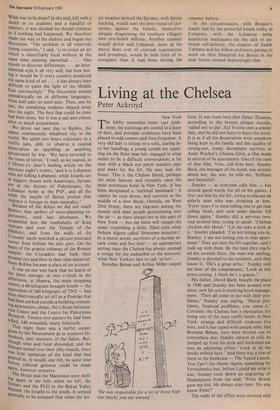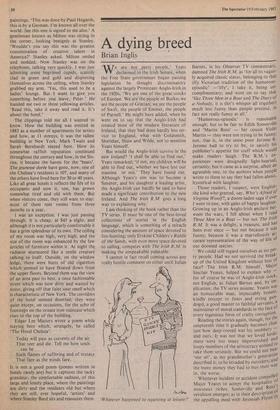Living at the Chelsea
Peter Ackroyd New York The fobby resembles some vast junk- ./ shop; the paintings are coated in a layer of dust, and portable sculptures have been placed in odd corners and then forgotten. A very old lady is sitting on a sofa, staring in- to her handbag; a young couple are squat- ting on the floor near her, engaged in what seems to be a difficult conversation; a fat man with a black eye patch wanders past and waits for the lift. He may wait for hours. This is the Chelsea Hotel, perhaps the most famous and certainly once the most notorious hotel in New York. It has been designated a 'national landmark': it cannot be torn down, and survives in the middle of a slow decay. Outside, on West 23rd Street, there are vagrants asking for money and mad people gesticulating into the air — as there always are in this part of New York — but the hotel will remain the same, crumbling a little, filled with what Nelson Algren called 'lonesome monsters'. In a recent novel-, survivors of a nuclear at- tack come and live here — an appropriate setting since the Chelsea has always seemed a refuge for the embattled or the insecure, what New Yorkers like to call 'artists'.
Brendan Behan and Arthur Miller stayed 'He was responsible for a lot of those high- rise blocks you see around.' here. It was from here that Dylan Thomas, according to the bronze plaque outside, `sailed out to die'. Sid Vicious met a similar fate, and he did not have to leave the hotel. It is as if all the desperation were somehow being kept in the family and this quality of strung-out, ironic doominess survives in Andy Warhol's Chelsea Girls, a film made in several of its apartments. One of the stars of that film, Viva, still lives here. Stanley Bard, the manager of the hotel, was ecstatic about her; she was, he told me, 'brilliant and beautiful'.
Stanley — as everyone calls him — has several good words for all of his guests. I first saw him by the lift, trying to placate an elderly man who was shouting at him. 'Forty years I've been telling you to get that ceiling fixed, and now some plaster fell down again.' Stanley did a nervous two- step around him, trying to speak. 'Chelsea chicken shit Hotel.' Let me take a look at it,' Stanley pleaded. 'I'm not letting you in, Stanley. I am not letting you in that apart- ment.' They got into the lift together, and I rode up with them. By the time they reach- ed the seventh floor, the man was smiling. Stanley is devoted to his residents, and they know it. 'He's a great artist,' Stanley told me later of the complainant, 'Look at this press-cutting. I think he's a genius.'
His father, David Bard, bought the place in 1940 and Stanley has been around ever since; now his son is studying hotel manage- ment. 'They all come to me with their pro- blems,' Stanley was saying, 'Moral pro- blems, financial problems, you name it.' Certainly the Chelsea has a reputation for being one of the least stuffy hotels in New York: strange and difficult creatures live here, and it has coped with people who, like Brendan Behan, have been thrown out of everywhere else. Stanley cannot sit still; he jumped up from his desk and beckoned me into an adjoining office. 'Look at all the books written here.' And there was a row of them in the bookcase — The Naked Lunch, You Can't Go Home Again, something by Yevtushenko but, before I could see what it was, Stanley took down an engraving of Shakespeare from the wall. 'Peter Brook gave me this. He always stays here. Do you know Peter?'
The walls of the office were covered with paintings. 'This was done by Paul Hogarth, this is by a German. I'm known all over the world. See this one is signed to me also.' A gentleman known as Milton was sitting in the corner, looking benignly at Stanley. `Wouldn't you say this was the greatest concentration of creative talent in America?' Stanley asked. Milton smiled and nodded. Now Stanley was on the telephone, talking very quickly. I was just admiring some begrimed cupids, scantily clad in green and gold and disporting themselves across the ceiling, when Stanley grabbed my arm. 'Yes, this used to be a ladies' lounge. But I want to give you something before you leave, Peter.' He handed me two or three yellowing articles. `Read this, take it away and read it. It's about the hotel.'
The clippings told me all I wanted to know. How the building was erected in 1883 as a number of apartments for artists and how, at 11 storeys, it was the tallest building in. New York. Mark Twain and Sarah Bernhardt stayed here. How its somewhat raffish reputation continued throughout the century and how, in the Six- ties, it became the haven for the 'beats'. The jeunesse doree have gone, now; one of the Chelsea's residents is 107, and many of the others have lived here for 30 or 40 years. Like all great hotels it reflects the life of its occupants and now it, too, has grown somewhat tired and old with them. But when visitors come, they still want to stay: most of them rent rooms from three months to a year.
I was an exception. I was just passing through. It is cheap, at $45 a night, and although it is not particularly comfortable it has a grim splendour of its own. The ceiling of my room was high, very high, and the size of the room was enhanced by the few articles of furniture within it. At night the radiator murmured like a senile creature talking to itself. Outside, on the window ledge, there were butts of old cigarettes which seemed to have floated down from the upper floors. Beyond them was the view of an area past its best, a once fashionable street which was now dirty and wasted by noise, giving off that faint sour smell which is characteristic of New York. The corridors of the hotel seemed deserted; they were quiet except, on occasions, for the echo of footsteps on the ornate iron staircase which rises to the top of the building.
Edgar Lee Masters wrote a poem while staying here which, strangely, he called `The Hotel Chelsea': Today will pass as currents of the air That veer and die. Tell me how souls can be Such flames of suffering and of ecstasy That fare as the winds fare.
It is not a good poem (poems written in hotels rarely are) but it captures the tacky grandeur, the comfortable sadness, of this large and lonely place, where the paintings are dirty and the residents old but where they are still, ever hopeful, 'artists' and where Stanley Bard sits and reassures them.







































 Previous page
Previous page